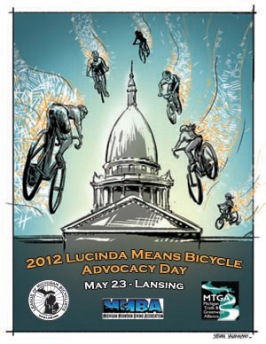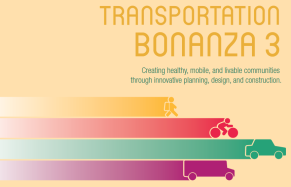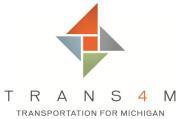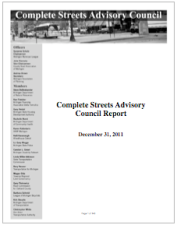You are currently browsing League of Michigan Bicyclists’s articles.
 Transportation for Michigan wants to hear how your streets are being made complete! This summer the State Transportation Commission is creating a Complete Streets policy as required by Michigan’s PA 135. Share your story, good or bad, about how Complete Streets (or lack thereof) has impacted you personally, your community’s efforts to develop and implement Complete Street policy and projects, or how transportation planning for Complete Streets projects has worked in your community. Your stories will illustrate the importance of Complete Streets and implementing policies that create roads for all modes.
Transportation for Michigan wants to hear how your streets are being made complete! This summer the State Transportation Commission is creating a Complete Streets policy as required by Michigan’s PA 135. Share your story, good or bad, about how Complete Streets (or lack thereof) has impacted you personally, your community’s efforts to develop and implement Complete Street policy and projects, or how transportation planning for Complete Streets projects has worked in your community. Your stories will illustrate the importance of Complete Streets and implementing policies that create roads for all modes.
Please fill out the form here and submit your story today!
Stand up for Complete Streets and the preservation of non-motorized funding at the 2012 Lucinda Means Bicycle Advocacy Day on May 23rd.
Bicyclists and Complete Streets supporters will meet with members of the Michigan Legislator on May 23rd at the State Capitol to advance legislative priorities aimed to make Michigan a more bicycle-friendly state. The event will be hosted by the League of Michigan Bicyclists, Michigan Trails and Greenways Alliance and Michigan Mountain Biking Association. All non-motorized transportation advocates are encouraged to participate.
Their Advocacy Agenda (PDF) includes a number of items such as establishing vulnerable roadway user designations for bicyclists, pedestrians and wheelchair users to create enhanced penalties for drivers who injure or kill a vulnerable roadway user. Advancing bikes-on-trains is another top priority. Roll-on bike service would allow cyclists to take bicycles on-board Michigan Amtrak trains, making multi-modal travel easier in Michigan. This would extend Complete Streets principles of connectivity further than a communities geographic boundaries by linking local bicycle networks and passenger rail service.
Also included in the Advocacy Day agenda are a few bills that are raising the eyebrows of Complete Streets advocates across the state. SB 921 (Ouiment) and HB 5304 (Jansen) were both recently introduced as part of Governor Snyder’s transportation funding reform proposals. Language in these bills, needlessly eliminates the Michigan Complete Streets Advisory Council (MCSAC). The Council, comprised of representatives from 18 statewide government and non-government stakeholder agencies, was created as a result of Public Act 135 of 2010. It is charged with providing education and advice to the State Transportation Commission (STC), county road commissions, municipalities, interest groups, and the public on the development, implementation, and coordination of Complete Streets policies.
To date, the MCSAC has focused its efforts solely on drafting recommendations for the STC regarding the statewide policy for MDOT. As a result, little guidance has been provided to local units of government across the state.
While Michigan leads the nation with the most adopted Complete Streets ordinances and resolutions (over 70 in total), many communities are still hesitant to advance Complete Streets until the MCSAC provides further recommendations. The MCSAC provides valuable oversight and guidance for the effective implementation of Complete Streets throughout the state. Dissolving the MCSAC will create an unfortunate void for communities seeking to make their roads and streets safer for all users. The collective expertise of MCSAC should continue to be utilized as MDOT and local communities work to implement the finalized policy.
Another bill of concern is HB 5303, which removes a funding requirement from Act 51 that obligates communities and road agencies to spend a minimum of 1% of their transportation funding on essential non-motorized transportation projects.
Worse yet, HB 5303 includes provisions that reward funding to road agencies based on the number of Vehicle Miles Traveled (VMT) under their jurisdiction. This creates disincentives for investments in alternative transportation options such public transit systems and bicycle networks.
The bill penalizes communities and road agencies for making systemic improvements like “road diets,” a popular technique that reduces the number of travel lanes on roads designed to carry more vehicle traffic than they do in reality. A common “road diet” improvement converts four-lane roads that have lower traffic volumes into two-lane roads that also include center turn lanes and additional safety features such as bike lanes, creating new transportation options without causing additional congestion.
You can learn more about these issues and register for the 2012 Lucinda Means Bicycle Advocacy Day at www.LMB.org/advocacyday.
The Complete Streets Advisory Council will meet at 2 p.m., Thursday, April 26, at the Capitol Commons Center, 400 S. Pine St., in Lansing. The meeting is open to the public.
The 18-member council was appointed in accordance with Public Act 135 of 2010. The group’s role, according to law, is to advise the State Transportation Commission, county road commissions and municipalities on Complete Streets policies. The law also requires the State Transportation Commission to enact a Complete Streets policy by August 2012. A “complete street” refers to a roadway that provides appropriate access to all legal users, including motorists, bicyclists, pedestrians and those traveling by assistive devices, such as wheelchairs.
If you need special assistance to attend the meeting, contact Dorothy Thompson at 517-241-4890. The public also can submit comments prior to the meeting via e-mail to [email protected].
Complete Streets Advisory Council members represent road and transit agencies, state agencies, walking and biking organizations, and environmental, senior citizens and disabled persons groups. More information is available online at: www.michigan.gov/completestreets
Reposted from the League of Michigan Bicyclists

Currently in Michigan, bikes are not allowed on board Amtrak trains, nor as checked luggage. Urge Amtrak to allow bikes on Michigan trains. Click the image to sign the petition.
LMB is extremely pleased that the recently published Michigan State Rail Plan makes clear recommendations that bicycles need to be accommodated on Michigan passenger trains. LMB thanks the Michigan Department of Transportation for recognizing this need. We also thank all of our supporters who responded to our call to submit comments to the rail plan this past year.
We now are asking for your help again to ensure that these recommendations are acted on promptly. Please sign our petition urging Amtrak to implement roll-on bicycle service on all Michigan service routes as they have already done in other states.
Currently in Michigan, bikes are not allowed on board Amtrak trains, nor as checked luggage. On board accommodations for bicycles will make seamless multi-modal connections possible by allowing passengers to bicycle to train stations, ride the train, and then conveniently bicycle to their final destinations within the community.
Our state is home to a number of bicycle tours in or near Michigan communities serviced by Amtrak. By adding bike facilities on Amtrak trains, many Michigan communities could benefit from increased tourism spending, particularly from vacationing Chicago residents. Without options to bring bicycles on board, Michigan is losing out on significant travel-related spending generated by bicycle tourism. Commuters traveling within Michigan would also have additional transportation options.
We encourage everyone to sign the petition, but it is especially important for Amtrak to hear from individuals living or working in or around current stations locations in Albion, Ann Arbor, Bangor, Battle Creek, Birmingham, Dearborn, Detroit, Dowagiac, Durand, East Lansing, Flint, Grand Rapids, Holland, Jackson, Kalamazoo, Lapeer, New Buffalo, Niles, Pontiac, Port Huron, Royal Oak, and St. Joseph/Benton Harbor. [The petition has received over 2350 signatures since it was launched]
Please click here to add your name to the petition and please share the petition link over your networks. When you add your name to the petition please use the “Why This Is Important” option to help personalize the message.
For those on Facebook, we have also created a Facebook Event titled “Tell Amtrak to Allow Bikes on Trains - Sign the Petition” to help raise awareness around this issue.
We sincerely appreciate your support on this issue and hope that by spring we will all have the ability to bring bicycles on board passenger trains in our state.
Join Trans4M for an exciting day in Lansing meeting with our legislators!
Thursday, February 23, 9am-4pm
Transportation for Michigan (Trans4M) members and supporters will meet with legislators to educate them on the Regional Transit Authority (RTA) and other Trans4M priorities. Legislative background and talking points will be provided. The agenda includes:
- 9:00 am – Sign in, welcome briefing and plan for the day
- 10:00 am - Meetings with House members (pre-scheduled meetings or drop-by visits)
- Senate will be in session (you can also ask to talk to your Senator off the floor)
- 12 noon - Lunch with legislators - Lunch provided
- 1:00 pm - Meetings with Senators (pre-scheduled meetings or drop-by visits)
- House will be in session (you can ask to talk with your Rep off the floor)
- 3:00 pm - Brief wrap up meeting and reporting back
Specific locations at the capitol to be announced soon.
Three important things to do before attending:
- Make sure to RSVP at www.tinyurl.com/Trans4Mday so we know how many to expect and can coordinate legislative meetings.
- Make sure to note whether you want to ride on the bus from Southeast Michigan or whether you’d like to carpool.
- Work with other advocates from your area to schedule meetings with your legislators for while you’re in Lansing. (Contact [email protected] for a sample meeting request letter.)
- Join us for a preview conference call to learn more about the issues and prepare. This call is scheduled for Tuesday, Feb 21 from 6-7pm at 605-475-4850, code 636655#.
For more information, contact Allie or Tim at 517-487-9539.
Trans4M is a statewide coalition working to make Michigan communities more livable and our economy more robust through transportation policy reform. We envision a connected, convenient system linking more frequent, reliable and affordable passenger rail and public transit, as well as active transportation and complete streets. www.Trans4M.org
The Complete Streets Advisory Council met yesterday and announced the release of an annual report detailing progress made since Complete Streets legislation went into effect in Michigan on Aug. 1, 2010. The report is available online at: www.michigan.gov/completestreets or can be viewed in the PDF viewer below.
The Complete Streets law was enacted to encourage counties, cities, villages and townships to work cooperatively to incorporate policies that ensure that roads and streets take into account the mobility needs of all legal users, including bicyclists, pedestrians and those traveling by assistive devices such as wheelchairs. Public Acts 134 and 135 of 2010 also requires the State Transportation Commission to enact a Complete Streets policy for MDOT by August 2012.
The 18-member council worked together over the last year to develop a vision statement and sample policy language for the State Transportation Commission. The report released yesterday notes that 63 Michigan communities have enacted Complete Streets policies and/or resolutions as of November 2011, putting Michigan ahead of all other states.
Members of the Complete Streets Advisory Council represent road and transit agencies, state agencies, walking, biking and environmental organizations, senior citizen and disabled persons groups. The council’s role, according to law, is to provide education and advice to the State Transportation Commission, county road commissions and municipalities. More information is available online at: www.michigan.gov/completestreets.
The Complete Streets Advisory Council will meet at 2 p.m., Wednesday, January 25, at the Capitol Commons Center, 400 S. Pine St., in Lansing. The meeting is open to the public.
The 18-member council was appointed in accordance with Public Act 135 of 2010. The group’s role, according to law, is to advise the State Transportation Commission, county road commissions and municipalities on Complete Streets policies. The law also requires the State Transportation Commission to enact a Complete Streets policy by August 2012. A “complete street” refers to a roadway that provides appropriate access to all legal users, including motorists, bicyclists, pedestrians and those traveling by assistive devices, such as wheelchairs.
If you need special assistance to attend the meeting, contact Dorothy Thompson at 517-241-4890. The public also can submit comments prior to the meeting via e-mail to [email protected] or in writing to:
Michelle Myers,
Departmental Specialist
Intermodal Policy Division
Michigan Department of Transportation
P.O. Box 30050, 425 W. Ottawa
Lansing, Michigan 48909
Complete Streets Advisory Council members represent road and transit agencies, state agencies, walking and biking organizations, and environmental, senior citizens and disabled persons groups. More information is available online at: www.michigan.gov/completestreets
 The Michigan Association of Planning, in partnership with the Michigan Safe Routes to School (SR2S) Program, the Michigan Department of Transportation (MDOT), the Michigan Department of Community Health (MDCH), and the Michigan Municipal League (MML), is launching its 3rd annual Transportation Bonanza! This event was designed to bring together professionals from the fields of planning, education, transportation, health, engineering, natural resource and environmental protection, architecture, landscape architecture, and others to align around the topic of community building for health and accessibility.
The Michigan Association of Planning, in partnership with the Michigan Safe Routes to School (SR2S) Program, the Michigan Department of Transportation (MDOT), the Michigan Department of Community Health (MDCH), and the Michigan Municipal League (MML), is launching its 3rd annual Transportation Bonanza! This event was designed to bring together professionals from the fields of planning, education, transportation, health, engineering, natural resource and environmental protection, architecture, landscape architecture, and others to align around the topic of community building for health and accessibility.
We think that this year’s focus on the crossroads of schools and communities might appeal to your membership, constituents, partners, and/or staff. Transportation Bonanza 3 will deliver national and state experts to explore school facilities planning, how to implement Safe Routes to School successfully, collaborations between school districts and communities, public policies that impact the education system, and more.
Through valuable partnerships, the Transportation Bonanza series has continued to evolve from general transportation topics in its inaugural year to this year’s conference focusing on understanding the relationships between schools, community, and transportation; Safe Route to School; and Complete Streets. The benefits of attending are many and
include:
- Learning about the intricacies and interconnectedness of communities, public health, schools, and transportation
- Being better equipped to work with colleagues across multiple disciplines
- The registration price is a good value for the information provided
- Networking with colleagues across multiple disciplines
Just as the road networks we use to transport ourselves and our goods across multiple jurisdictions and cut through a variety of landscapes, so too do transportation planners, engineers, and advocates work with and through a variety of disciplines to enhance and improve our road systems. While each session is designed to relate to transportation in a unique way, from the relationship to schools to local government funding, there is an entire track dedicated to Context Sensitive Solutions and Complete Streets.
Date: February 16, 2012
Location: Lansing Center, Lansing
8:00 AM to 5:15 PM
Program: A full day of national experts and local perspectives, includes lunch, instruction, and refreshments.
Registration: $49 and online at http://planningmi.org/tb.asp
By: Myra Marie Tetteh, MPP
Detroit Complete Streets Coalition Coordinator

During a practice activity at the November events community members develop their vision of a better Detroit through complete streets infrastructure improvements.
The Detroit Complete Streets Coalition is continuing to grow. Current members include the following city departments: Department of Public Works (DPW), City Planning Commission (CPC), Detroit Department of Transportation (DDOT), Detroit Police Department (DPD), Planning and Development Department (PDD); community members; Wayne State University; and organizations such as the AARP, City Connect Detroit, Michigan Trails and Greenways Alliance, Southeast Michigan Council of Governments (SEMCOG), Transit Riders United (TRU), and Warriors on Wheels (WOW). The coalition has met monthly since May 2010 and shows no signs of slowing down.
Thus far, the coalition has held three community events and has participated in several others. The first event held back in March (2011) was attended by over 150 people and sponsored in part by Slow’s BBQ and the Gaelic League. The most recent events sponsored in part by the AARP and Detroit Food and Fitness Collaborative, held in early November (2011) were attended by approximately 100 people from various organizations and members of the community. The three events have educated residents on complete streets, highlighted local complete streets infrastructure, and allowed participants to give a glimpse of what improvements they wish to see.
The Detroit Complete Streets Coalition worked together to draft an ordinance to require complete streets planning for appropriate street projects. The ordinance when passed will be a big step for the city of Detroit to affirm its commitment to pedestrian and bicycle safety through infrastructure improvements for its residents and users. Currently, the ordinance is in the Law Department and following the official legal review the ordinance will be introduced by City Council and voted on for approval. It is our hope that though the city of Detroit is undergoing finance difficulties that this ordinance is not lost in the shuffle; improving health, safety, and community cohesiveness is a necessity in any economic time.
To learn more about the Detroit Complete Coalition or its work please contact us via email at [email protected], visit us on the web at www.detroitcompletestreets.org, or like us on Facebook at the Complete Streets in Detroit page.
UPDATE: @WalkBikeRollMI We’re excited about the webinar, but it’s unfortunately not open to general public. Looking into ways to offer it more widely.
 December 1, 2011, 2:00 p.m. Eastern
December 1, 2011, 2:00 p.m. Eastern
A common concern in transportation agencies is that implementing Complete Streets policies will cost too much. This in-depth, hour and a half long webinar will provide several strategies for responding to this concern, including examples and resources from communities that have overcome this issue. The webinar will provide Communities Putting Prevention to Work (CPPW) teams with information both about the low cost of many complete streets treatments, as well as ways to talk to transportation professionals about the added value and community support that result from complete streets implementation.

















